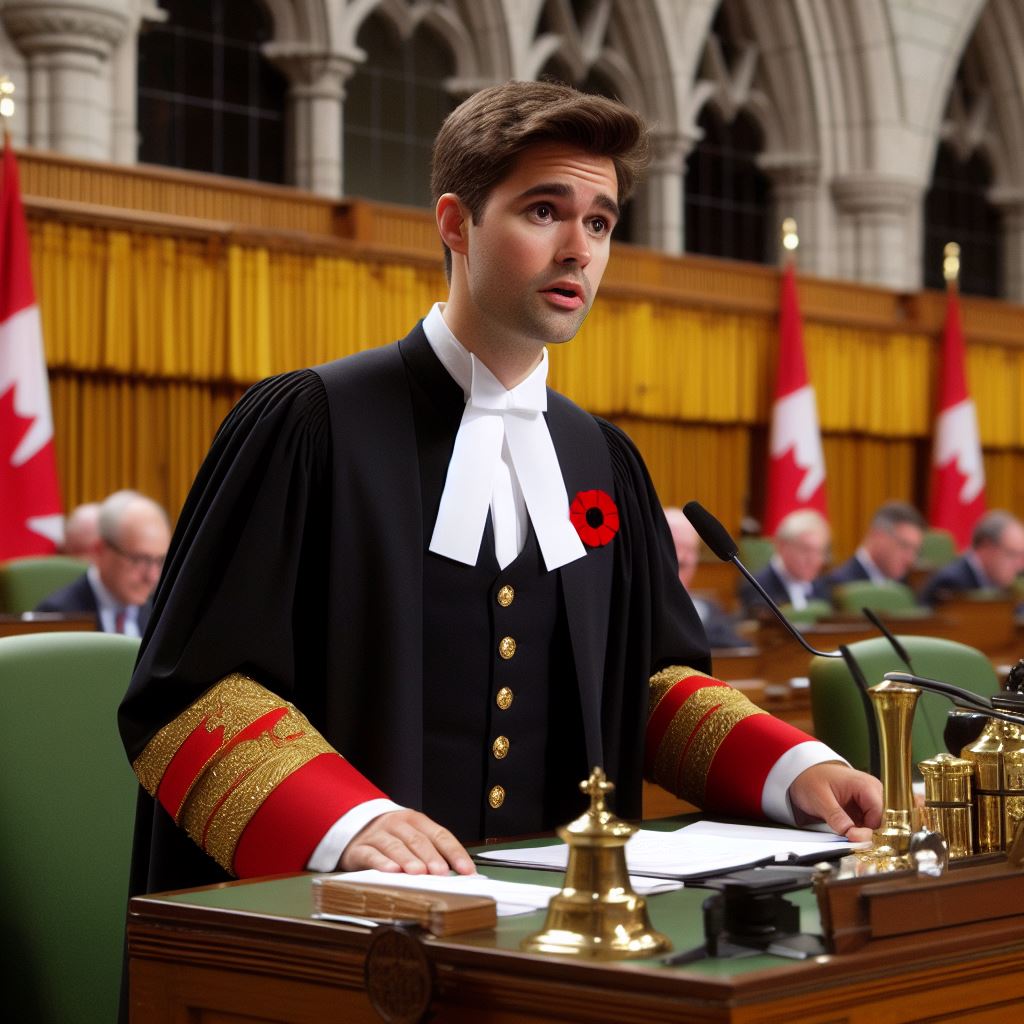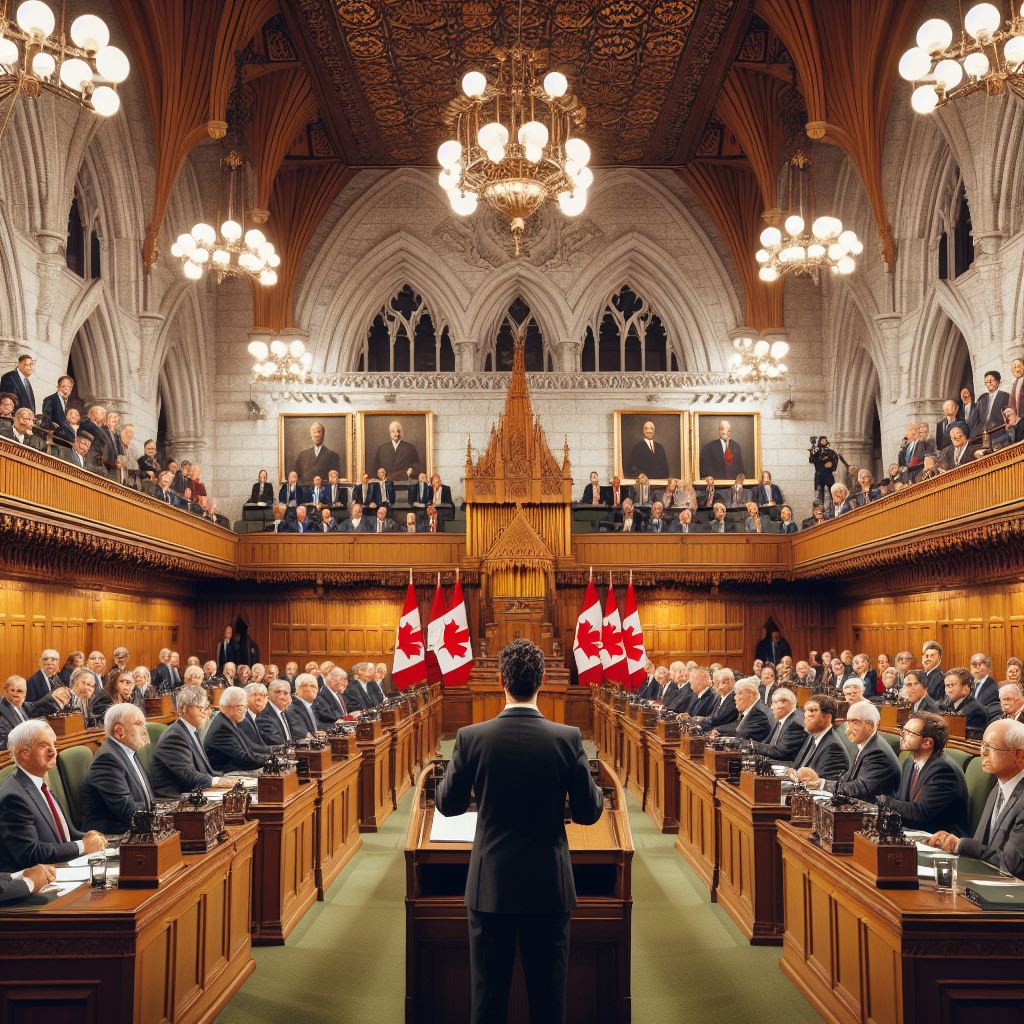Introduction
Canadian political ethics is an essential topic that requires citizens’ understanding and attention.
In this blog post, we will explore the importance of political ethics and its impact on Canadian society.
By delving into this subject, we aim to enlighten readers about the significance of ethical conduct in politics.
Against the backdrop of Canada’s rich political tapestry, this deep dive into political ethics encompasses a multifaceted examination of the ethical frameworks, regulatory mechanisms, and evolving norms that define the conduct of political actors.
From the constitutional roots that anchor ethical responsibilities to the contemporary dynamics of power and influence, we navigate the terrain where values intersect with governance.
This exploration aims not only to dissect historical milestones but also to scrutinize modern challenges, addressing issues of transparency, accountability, and the ethical dimensions of policymaking.
As we traverse the intricate landscape of Canadian political ethics, we will uncover the delicate equilibrium required to navigate conflicting interests, uphold democratic principles, and foster a climate of trust among citizens.
With a discerning lens on the ethical considerations influencing decision-making, conflict resolution, and the pursuit of the common good, this journey seeks to illuminate the pathways toward responsible and principled political leadership.
Join us on this in-depth analysis, as we unravel the layers of Canadian political ethics, fostering a deeper understanding of the ethical imperatives that underpin effective and morally grounded governance.
Definition and Key Concepts
In this section, we will delve deep into the topic of Canadian Political Ethics.
Political ethics refers to the moral principles and values that guide the conduct of individuals and institutions involved in politics.
It is of great significance in the Canadian context, as it shapes the democratic process and ensures the accountability and transparency of the government.
Now, let us begin by defining political ethics and understanding its significance in Canada.
Define political ethics and its significance in the Canadian context
Political ethics can be defined as the set of moral principles and values that guide the behavior and actions of politicians, political parties, and government institutions.
It provides a framework for ethical decision-making and ensures the proper functioning of democratic processes.
In Canada, political ethics play a crucial role in fostering trust and confidence in the political system.
Now, it is important to differentiate between ethics and laws/regulations in politics.
While laws and regulations define the boundaries and provide a legal framework, ethics go beyond mere legality.
Ethics reflect the moral standards and values that individuals and institutions should uphold.
While something may be legally permissible, it can still be viewed as ethically wrong.
The principles and values that guide political ethics in Canada
In Canada, several key principles and values guide political ethics.
Transparency
Transparency is one such principle that ensures openness and access to information.
It requires politicians to disclose their financial interests and conflicts of interest, allowing citizens to hold them accountable.
Accountability
Accountability is another crucial value that holds politicians responsible for their actions and decisions.
It ensures that politicians are answerable to the public for their performance in office.
Unlock Your Career Potential
Visualize a clear path to success with our tailored Career Consulting service. Personalized insights in just 1-3 days.
Get StartedPublic interest
Public interest is a foundational principle of political ethics in Canada.
It requires politicians to prioritize the well-being and needs of the public over personal and partisan interests.
Politicians are expected to act in the best interest of the citizens they represent, making decisions that benefit the greater good rather than individual gain.
Integrity is another core value that guides political ethics. It emphasizes honesty, trustworthiness, and adherence to ethical principles.
Politicians are expected to act with integrity, maintaining high ethical standards in their conduct and decision-making.
Another important value is respect for diversity and inclusiveness.
Canada is a multicultural nation, and political ethics emphasize the need to respect and include diverse perspectives and voices.
This principle ensures that the government represents and considers the interests of all Canadians, regardless of their background or beliefs.
Furthermore, fairness and justice are essential principles that shape political ethics in Canada.
Fairness requires politicians to treat all citizens and stakeholders impartially and without bias.
Justice ensures that laws and policies are enacted and enforced in a manner that upholds equality and fosters social well-being.
Lastly, accountability is a fundamental value that underpins political ethics in Canada.
Politicians are accountable to the public for their actions, decisions, and use of public resources.
Through mechanisms such as elections, oversight agencies, and media scrutiny, citizens can hold politicians accountable for their conduct and performance.
In short, political ethics in Canada are defined by a set of principles and values that guide the behavior and decision-making of politicians and government institutions.
Transparency, accountability, public interest, integrity, respect for diversity, fairness, and justice are some of the key concepts that shape political ethics.
Understanding and upholding these principles is vital for maintaining a healthy and functioning democracy in Canada.
Read: Politician Salaries: A Canadian Overview
Historical Overview
A brief historical background of political ethics in Canada
Political ethics in Canada has a deep-rooted history that dates back to the nation’s early days.
During the colonial era, politics centered around loyalty to the British Crown and maintaining social order.
As Canada evolved into a self-governing dominion, ethical standards emerged based on democratic principles.
The introduction of responsible government in the mid-19th century set the stage for ethical conduct.
Significant Milestones and Events
- The creation of the Dominion of Canada in 1867 marked a significant milestone in political ethics.
- Women’s suffrage was achieved in various provinces throughout the early 20th century, enhancing inclusivity.
- Following World War II, Canada witnessed the rise of social democracy, challenging traditional political ethics.
- The Charter of Rights and Freedoms, enacted in 1982, brought ethical considerations to the forefront.
Scandals and Controversies
- The Pacific Scandal in 1873 involving bribes and corruption tarnished political ethics in Canada.
- The sponsorship scandal in the early 2000s revealed influence peddling and illegal campaign financing.
- The AdScam scandal significantly impacted the public trust in political institutions and ethical standards.
- The recent SNC-Lavalin controversy raised questions about the ethics of political interference in legal matters.
Read: Paths to Becoming a Politician in Canada
Current Ethical Issues in Canadian Politics
As with any political system, Canadian politics is not exempt from ethical dilemmas.
Let’s explore some of the prominent ethical issues facing Canadian politics today:
Political Campaign Financing and Lobbying Activities
One of the most pressing ethical issues in Canadian politics is the influence of money in political campaigns.
It raises concerns about democracy and fairness. Lobbying activities, in particular, have the potential to sway political decisions in favor of the wealthy or well-connected.
Ethical Implications of Political Decision-Making
The way political decisions are made can also raise ethical concerns.
Conflicts of interest, where politicians may prioritize personal or financial gain, can compromise the integrity of the decision-making process.
It erodes public trust in the government and hampers the pursuit of the greater good.
Conflicts of Interest and Their Impact
Conflicts of interest can have disastrous consequences for political decision-making.
When politicians have a personal stake in the outcome of a particular policy or decision, it becomes difficult to ensure unbiased and ethical choices.
It can lead to decisions that benefit individuals or corporations at the expense of the general public.
Challenges of Maintaining Ethical Standards
In today’s digital age, maintaining ethical standards is becoming increasingly challenging.
The rise of social media and digital communication platforms has added new dimensions to political ethics.
The speed and breadth of information transmission can lead to misinformation, spreading false narratives, and manipulating public opinion.
Moreover, the anonymity provided by online platforms can embolden individuals to engage in unethical behavior, such as spreading hate speech or engaging in cyberbullying.
Upholding ethical standards in the face of these challenges has become a paramount concern for Canadian politicians.
The Way Forward
Although ethical issues continue to persist in Canadian politics, steps can be taken to address and mitigate these challenges:
- Stricter regulations and transparency rules regarding political campaign financing and lobbying activities can help reduce the undue influence of money in politics. By limiting corporate donations and improving disclosure requirements, a more level playing field can be established.
- Implementing robust conflict-of-interest guidelines and promoting ethical behavior among politicians are essential. Clear rules and severe consequences for those who breach ethical standards can serve as deterrents and help restore public trust.
- Educating the public about the importance of critical thinking and media literacy can help combat the negative impact of social media and digital communication. Encouraging individuals to verify information before sharing and promoting civility in online interactions can contribute to a healthier political discourse.
- Engaging in public discussions and consultations to ensure that ethical concerns are included in policy-making processes. By actively involving citizens, politicians can better reflect the values and best interests of the Canadian population.
In essence, Canadian politics faces various ethical challenges, but addressing them is crucial for maintaining a healthy democracy.
By addressing campaign financing, conflicts of interest, and the challenges posed by social media, Canadian politics can strive for greater transparency, accountability, and ethical decision-making.
Read: A Day in the Life of a Canadian Politician

Regulatory and Oversight Framework
The existing legal and regulatory mechanisms in place to promote political ethics
Canadian political ethics are safeguarded by a robust set of legal and regulatory mechanisms.
These mechanisms play a crucial role in promoting ethical conduct and ensuring accountability among political actors.
The role of institutions such as the Office of the Ethics Commissioner
One of the key institutions responsible for enforcing political ethics is the Office of the Ethics Commissioner.
This office acts as an independent oversight body, entrusted with investigating and addressing ethical violations committed by public officeholders.
The existing legal and regulatory framework includes various measures to prevent conflicts of interest and maintain the integrity of public officials.
For instance, the Conflict of Interest Act establishes clear guidelines for elected officials on issues such as accepting gifts, post-employment restrictions, and disclosure of financial interests.
Similarly, the Lobbying Act regulates the activities of lobbyists and requires them to register and disclose their lobbying activities.
This transparency mechanism aims to prevent undue influence on policymakers and ensures transparency in the political decision-making process.
The role of the Office of the Ethics Commissioner is vital in upholding political ethics.
The commissioner has the power to conduct investigations, issue rulings, and impose penalties for violations of ethical standards.
This independent oversight body serves as a deterrent, sending a strong message that unethical conduct will not be tolerated.
The effectiveness of these mechanisms in ensuring ethical conduct in Canadian politics
However, the effectiveness of these mechanisms in ensuring ethical conduct is a subject of debate.
Critics argue that the penalties imposed for ethical violations are often insufficient and fail to act as a real deterrent.
They argue for stricter enforcement and more severe consequences for those found guilty of ethical misconduct.
Proposed changes or reforms to the regulatory framework
Proposed changes and reforms to the regulatory framework have been put forward by various stakeholders.
One such proposal is the creation of a parliamentary ethics committee with enhanced investigative powers.
This committee would have the authority to independently investigate alleged ethical violations and recommend appropriate actions.
Furthermore, there have been calls to strengthen the Conflict of Interest Act by expanding its scope and clarifying certain provisions.
This would ensure that public officeholders have clear guidelines and are held accountable for any potential conflicts of interest that may arise during their tenure.
Another area of proposed reform relates to political financing.
Stricter regulations on campaign financing, donation limits, and disclosure requirements are seen as crucial in preventing undue influence and promoting a fair and transparent electoral process.
In brief, the regulatory and oversight framework in place to promote political ethics in Canada is extensive.
While the Office of the Ethics Commissioner and existing legislation play a crucial role, there is room for improvement.
Enhancing enforcement, imposing stricter penalties, and implementing proposed changes will help strengthen ethical conduct in Canadian politics.
Read: Key Skills Needed for Political Careers
Explore Further: Volunteer Firefighting in Rural Canada
Public Perception and Citizen Engagement
In this section, we will delve into the public’s perception of political ethics in Canada, the impact of ethical breaches on public trust in government institutions, and the crucial role of citizen engagement and activism in holding politicians accountable.
The Public’s Perception of Political Ethics in Canada
- The public’s perception of political ethics plays a vital role in the functioning of a democratic society.
- Canadians expect their politicians to act with integrity, honesty, and transparency.
- There is growing concern among citizens about the ethical conduct of politicians.
- The perception of unethical behavior erodes public trust in the political system.
- Scandals, conflicts of interest, and unethical practices have dented the image of politics.
- Public perception can significantly impact voter turnout and political participation.
- Addressing public concerns regarding political ethics is crucial for a healthy democracy.
The Impact of Ethical Breaches on Public Trust in Government Institutions
- When politicians engage in unethical behavior, it erodes public trust in government institutions.
- Instances of corruption and fraud can have long-lasting effects on public perception.
- Ethical breaches can lead to a decreased willingness to support political parties or candidates.
- Citizens may become disillusioned, leading to apathy and disengagement from the political process.
- Restoring public trust in government requires swift action and accountability.
- Being transparent and enforcing strict ethical standards can help rebuild trust.
The Role of Citizen Engagement and Activism in Holding Politicians Accountable
- Citizen engagement and activism are fundamental to a healthy political system.
- Active participation by citizens acts as a check on political power and unethical behavior.
- Public pressure from engaged citizens can force politicians to be more accountable.
- Citizen-led initiatives and campaigns often result in ethical reforms and policy changes.
- Through peaceful protests, citizens can express their dissatisfaction and demand change.
- Digital platforms and social media provide new avenues for citizen engagement and activism.
- By holding politicians accountable, citizens contribute to a more ethical and responsive government.
In this section, we have explored the public’s perception of political ethics in Canada, discussed the impact of ethical breaches on public trust in government institutions, and analyzed the role of citizen engagement and activism in holding politicians accountable.
Public perception and citizen engagement are integral to the functioning of a healthy democratic system.
In the next section, we will delve into the challenges faced in regulating political ethics and propose potential solutions.
Learn More: Retirement Plans for Canadian Policemen
Conclusion
This blog post explored the topic of Canadian political ethics and its significance in a healthy democracy.
We discussed the key points that highlight the importance of upholding political ethics.
Political ethics play a crucial role in maintaining the trust and legitimacy of the political system.
It ensures that elected officials act in the best interest of the public and adhere to moral and ethical standards.
By embracing political ethics, we can create a transparent and accountable political landscape in Canada.
Upholding these values strengthens democratic principles and fosters a sense of trust between citizens and their elected representatives.
To shape a more ethical political landscape, it is important for readers to stay informed and actively participate.
We should engage with various sources of information, critically analyze policies, and hold our politicians accountable for their actions.
Active participation can involve voting in elections, attending public meetings, joining advocacy groups, or even running for office ourselves.
Engaging in these activities helps to influence and shape political decisions that align with essential ethical principles.
As citizens, it is our duty to be vigilant and demand ethical behavior from our politicians.
By doing so, we contribute to the development of a more transparent, fair, and just political system in Canada.
Let us all stay informed, engage actively, and work together to create a more ethical political landscape that upholds the values essential for a strong and vibrant democracy in Canada.




